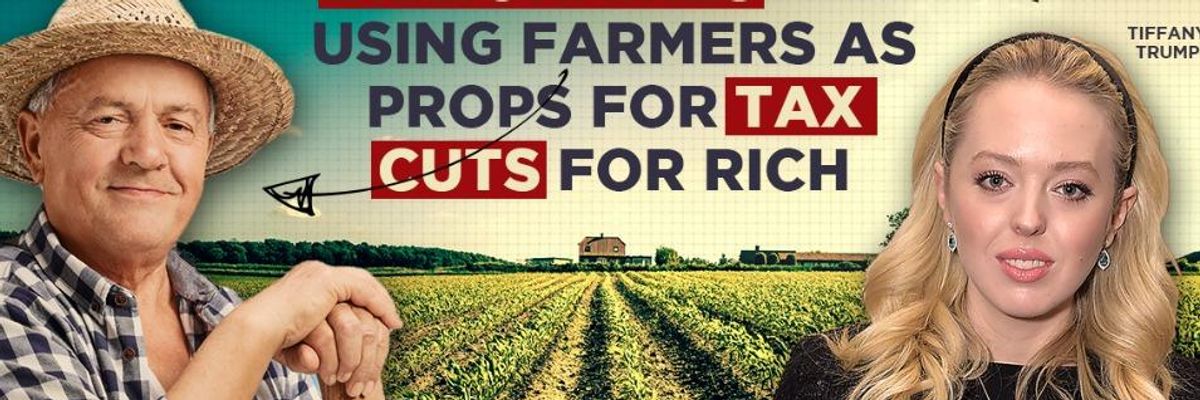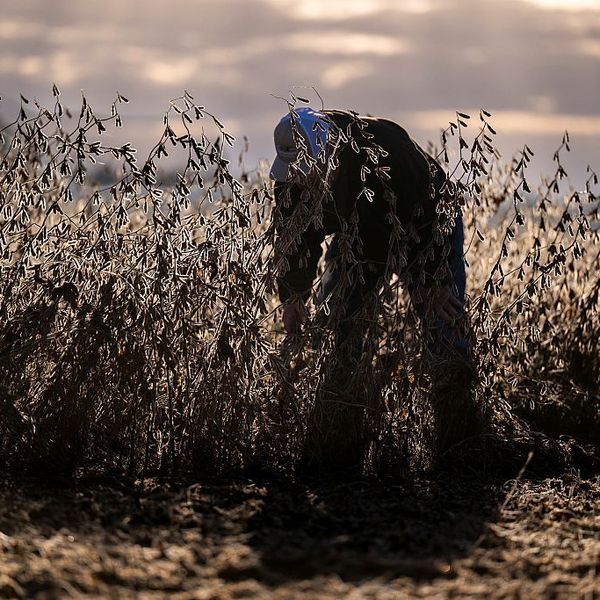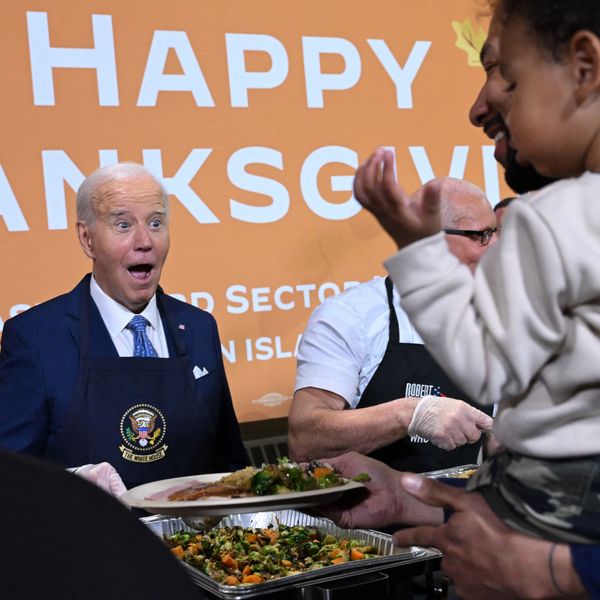
"Republicans have been using farmers and ranchers for decades to justify estate tax repeal," writes Collins.
Indiana Farmer Complaining about Estate Taxes with Trump Cashed $3.3 Million in Farmer Subsidy Checks
How billionaires try to use farmers as props for tax cuts for the ultra-rich
Kip Tom, the Leesburg Indiana farmer who will stand today with President Trump complaining about the federal estate tax, cashed over $3.3 million in farm subsidy checks, including $2.6 million between 2004 and 2014, the most recent data available.
Kip Tom and Tom Farms is one of the biggest corn and soybean producers in Indiana and the ninth largest farm subsidy recipient in Indiana.
Arriving at a total for Tom Farms subsidies required examining subsidies to three different ownership entities, as the farm went from individual ownership to an LLC in roughly 1995 and then formed Tom Farms Partners in 2004.
Between 2004 and 2014, Tom Farms Partners received $2,612,561 in subsidies, mostly commodity subsidies. Between 1996 and 2006, Tom Farms LLC cashed $667,732 in farm subsidy checks. In 1995, Kip Tom took in $42,826, but then refunded $17,494 for a net of $25,332. Between 1995 and 2014, this equals over $3,305,625 in government subsidies,
Over 41 of Indiana farmers do not receive any subsidies, according to the USDA.
The federal estate tax is a levy on the intergenerational transfer of immense wealth. The tax only applies to households with more than $11 million in assets. In Indiana, where President Trump kicked off his anti-estate tax campaign, fewer than one in 1,000 estates are subject to the estate tax, a grand total of only 70 people according to the Center on Budget and Policy Priorities.
Republicans have been using farmers and ranchers for decades to justify estate tax repeal. I have written extensively about the history of using farmers as the face of estate tax repeal, instead of the billionaires and multi-millionaires who actually pay the tax, going back to 2000.
SOURCES
From the Environmental Working Group Farm Subsidy Database:
- All three Tom Farms entities combined received $3.3 million in subsidies, which would place them number 9 on this list of biggest subsidy recipients.
- For data on subsidies to Tom Farm Partners, 2004-2014.
- Information about 1996-2005, Tom Farms LLC Direct subsidies.
- Direct 1995 farm subsidy to Kip Tom.
An Urgent Message From Our Co-Founder
Dear Common Dreams reader, The U.S. is on a fast track to authoritarianism like nothing I've ever seen. Meanwhile, corporate news outlets are utterly capitulating to Trump, twisting their coverage to avoid drawing his ire while lining up to stuff cash in his pockets. That's why I believe that Common Dreams is doing the best and most consequential reporting that we've ever done. Our small but mighty team is a progressive reporting powerhouse, covering the news every day that the corporate media never will. Our mission has always been simple: To inform. To inspire. And to ignite change for the common good. Now here's the key piece that I want all our readers to understand: None of this would be possible without your financial support. That's not just some fundraising cliche. It's the absolute and literal truth. We don't accept corporate advertising and never will. We don't have a paywall because we don't think people should be blocked from critical news based on their ability to pay. Everything we do is funded by the donations of readers like you. Will you donate now to help power the nonprofit, independent reporting of Common Dreams? Thank you for being a vital member of our community. Together, we can keep independent journalism alive when it’s needed most. - Craig Brown, Co-founder |
Chuck Collins is a senior scholar at the Institute for Policy Studies where he co-edits Inequality.org. His near future novel "Altar to An Erupting Sun” explores one community’s response to climate disruption. He is author of numerous books and reports on inequality and the racial wealth divide, including “The Wealth Hoarders: How Billionaires Spend Millions to Hide Trillions,” “Born on Third Base,” and, with Bill Gates Sr., of “Wealth and Our Commonwealth: Why American Should Tax Accumulated Fortunes.” See more of his writing at www.chuckcollinswrites.com
Kip Tom, the Leesburg Indiana farmer who will stand today with President Trump complaining about the federal estate tax, cashed over $3.3 million in farm subsidy checks, including $2.6 million between 2004 and 2014, the most recent data available.
Kip Tom and Tom Farms is one of the biggest corn and soybean producers in Indiana and the ninth largest farm subsidy recipient in Indiana.
Arriving at a total for Tom Farms subsidies required examining subsidies to three different ownership entities, as the farm went from individual ownership to an LLC in roughly 1995 and then formed Tom Farms Partners in 2004.
Between 2004 and 2014, Tom Farms Partners received $2,612,561 in subsidies, mostly commodity subsidies. Between 1996 and 2006, Tom Farms LLC cashed $667,732 in farm subsidy checks. In 1995, Kip Tom took in $42,826, but then refunded $17,494 for a net of $25,332. Between 1995 and 2014, this equals over $3,305,625 in government subsidies,
Over 41 of Indiana farmers do not receive any subsidies, according to the USDA.
The federal estate tax is a levy on the intergenerational transfer of immense wealth. The tax only applies to households with more than $11 million in assets. In Indiana, where President Trump kicked off his anti-estate tax campaign, fewer than one in 1,000 estates are subject to the estate tax, a grand total of only 70 people according to the Center on Budget and Policy Priorities.
Republicans have been using farmers and ranchers for decades to justify estate tax repeal. I have written extensively about the history of using farmers as the face of estate tax repeal, instead of the billionaires and multi-millionaires who actually pay the tax, going back to 2000.
SOURCES
From the Environmental Working Group Farm Subsidy Database:
- All three Tom Farms entities combined received $3.3 million in subsidies, which would place them number 9 on this list of biggest subsidy recipients.
- For data on subsidies to Tom Farm Partners, 2004-2014.
- Information about 1996-2005, Tom Farms LLC Direct subsidies.
- Direct 1995 farm subsidy to Kip Tom.
Chuck Collins is a senior scholar at the Institute for Policy Studies where he co-edits Inequality.org. His near future novel "Altar to An Erupting Sun” explores one community’s response to climate disruption. He is author of numerous books and reports on inequality and the racial wealth divide, including “The Wealth Hoarders: How Billionaires Spend Millions to Hide Trillions,” “Born on Third Base,” and, with Bill Gates Sr., of “Wealth and Our Commonwealth: Why American Should Tax Accumulated Fortunes.” See more of his writing at www.chuckcollinswrites.com
Kip Tom, the Leesburg Indiana farmer who will stand today with President Trump complaining about the federal estate tax, cashed over $3.3 million in farm subsidy checks, including $2.6 million between 2004 and 2014, the most recent data available.
Kip Tom and Tom Farms is one of the biggest corn and soybean producers in Indiana and the ninth largest farm subsidy recipient in Indiana.
Arriving at a total for Tom Farms subsidies required examining subsidies to three different ownership entities, as the farm went from individual ownership to an LLC in roughly 1995 and then formed Tom Farms Partners in 2004.
Between 2004 and 2014, Tom Farms Partners received $2,612,561 in subsidies, mostly commodity subsidies. Between 1996 and 2006, Tom Farms LLC cashed $667,732 in farm subsidy checks. In 1995, Kip Tom took in $42,826, but then refunded $17,494 for a net of $25,332. Between 1995 and 2014, this equals over $3,305,625 in government subsidies,
Over 41 of Indiana farmers do not receive any subsidies, according to the USDA.
The federal estate tax is a levy on the intergenerational transfer of immense wealth. The tax only applies to households with more than $11 million in assets. In Indiana, where President Trump kicked off his anti-estate tax campaign, fewer than one in 1,000 estates are subject to the estate tax, a grand total of only 70 people according to the Center on Budget and Policy Priorities.
Republicans have been using farmers and ranchers for decades to justify estate tax repeal. I have written extensively about the history of using farmers as the face of estate tax repeal, instead of the billionaires and multi-millionaires who actually pay the tax, going back to 2000.
SOURCES
From the Environmental Working Group Farm Subsidy Database:
- All three Tom Farms entities combined received $3.3 million in subsidies, which would place them number 9 on this list of biggest subsidy recipients.
- For data on subsidies to Tom Farm Partners, 2004-2014.
- Information about 1996-2005, Tom Farms LLC Direct subsidies.
- Direct 1995 farm subsidy to Kip Tom.

